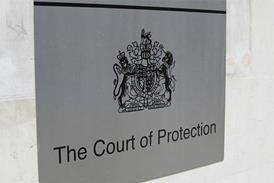As part of a wider package of measures in the fast-tracked Economic Crime (Transparency and Enforcement) Act 2022, a Register of Overseas Entities has been set up at Companies House for beneficial owners of overseas entities that own UK property. Warren Gordon looks at how it will impact on real estate transactions

The Economic Crime (Transparency and Enforcement) Act 2022 (“the Act”) forms part of the UK government’s strategy to combat economic crime and to crackdown on overseas criminals using UK property to launder money. There are implications for overseas entities that are, or are entitled to be, or will be the proprietor of land registered at the Land Registries for England and Wales, Scotland or Northern Ireland, or for parties dealing with them.
Although the Act received royal assent on 15 March 2022, it has taken time to set up the Companies House register. The overseas entities register (“register”) was launched on 1 August 2022 with the relevant statutory provisions relating to the register coming into force at the same time. The land registration elements of the Act come into force on 5 September 2022. There is a transitional period of six months from 1 August 2022 (“transitional period”) allowing for time for registrations and for other information to be provided to Companies House. The transitional period finishes on 31 January 2023. The restrictions that HM Land Registry will include on titles held by overseas entities will not take effect until after the end of the transitional period (except where a restriction is entered on the registration of a buyer or tenant overseas entity when it will take effect immediately but no earlier than 5 September 2022).
What is an overseas entity?
The Act applies to an “overseas entity”, which is defined as a body corporate, partnership or other entity that is a legal person governed by the law of a country or territory outside the United Kingdom. In addition to the more obvious overseas entities such as those from British Virgin Islands or Delaware, it also includes Jersey, Guernsey or Isle of Man entities. The legislation does not affect overseas individuals owning UK property directly or through a UK entity.
What does registration involve?
An overseas entity that owns or is entitled to own UK registered land will be required to register itself on the register, unless the entity is exempt (it seems that initially there will be no exemptions).
The application to register requires that details about the beneficial owners of the entity are provided, or if there are no beneficial owners, then its managing officers. The required information relates to the entity, not the property itself, so information is not being provided to Companies House about the beneficiaries of the property.
How is a beneficial owner defined?
A beneficial owner is an individual, a legal entity or a government or public authority (X), who meets any of a number of conditions in relation to the entity (Y). Those conditions include that X holds, directly or indirectly, more than 25% of the shares or voting rights in Y, or X has the right to exercise, or actually exercises, significant influence or control over Y. Part 2 of Schedule 2 to the Act contains full details of who is defined as a beneficial owner. The contents of the register will for the most part be available to the public, except for certain personal information and trusts information.
What happens post-registration?
The “registered overseas entity” is given an overseas entity ID and has a duty annually to confirm the information on the register remains up to date, or to deliver updated information. Failure to comply with the registration and updating obligations will seriously impact on the entity’s ability to sell, let or charge its land, and it is a criminal offence for the entity and its officers at fault with fines and/or imprisonment.
Verification process
An application cannot be made to Companies House until a “relevant person” has verified the relevant information relating to the entity to be provided to Companies House. “Relevant person” includes credit and financial institutions; auditors, insolvency practitioners, external accountants and tax advisers; independent legal professionals (so not in-house lawyers at the entity); trust or company service providers; and estate agents and letting agents, but all of them must be acting in the course of business carried on by them in the United Kingdom – this will be problematic if the UK business is unable to do the verification, because it is not based in the jurisdiction of the overseas entity. Problems with the verification process may delay registration at Companies House, which will in turn delay the making of the application to HM Land Registry which may cause issues with priority searches.
There are concerns that UK solicitors will be asked by clients to make the verification statement, when those solicitors are not in a position to do so. The Law Society has produced guidance to assist solicitors on how to approach requests to verify.
Does the Act apply to all overseas entities?
The Act does not apply to overseas entities who own unregistered land. For owners of registered freehold or leasehold land, it only applies to them if they became the owner on or after 1 January 1999 and are still the owner. The importance of that 1999 date is that it was from then that the Land Registry began to keep records of which titles were owned by overseas entities.
An affected entity should be gathering the information that it will need to make the application to be registered on the register. Companies House are or will be writing to overseas entities caught by the Act who own land in England, Wales and Scotland, to make sure they know about their responsibilities.
Entities may want their lawyers to assist them with finding out which entities are affected, through for example Land Registry searches, and potentially also to help with gathering the required information for the Companies House application.
Transitional provisions
There are a couple of important transitional provisions that an overseas entity which currently owns registered land needs to address:
1. If from 28 February 2022 the entity transfers its registered title, grants a lease for more than seven years or a legal charge, it is required by the end of the transitional period to apply to Companies House to be entered on the register and to provide other information including brief details about the transaction. Failure to do so is a criminal offence for the entity and officers of the entity, punishable by a fine.
2. The entity must apply to be registered on the register before 1 February 2023. Failure to do so is a criminal offence for the entity and every officer in default punishable by a fine and/or imprisonment of up to two years, unless the entity has disposed of its registered title before 1 February 2023.
Enforcement
The method under the legislation by which the government will enforce Companies House registration is through introducing controls over the ability of overseas entities or certain parties transacting with them to register themselves at HM Land Registry. The relevant disposition of land by or to the overseas entity remains valid, so there aren’t any issues about the beneficial interest not passing or the purchase money having to be returned. However, from 5 September 2022 and subject where relevant to the transitional period, the disposition may not be registered at the Land Registry if there has been no Companies House registration. The transactions that are affected are where an overseas entity transfers, grants a lease for more than seven years or grants a charge, or where the entity purchases or takes a lease for more than seven years. No other registrable dispositions are affected and an entity taking a charge is not affected.
A key means by which the Land Registry will police this is by entering a restriction on every registered freehold or leasehold title held by an overseas entity (such as for current owners). The addition of the restriction will not impact on existing priorities at the time that the restriction is added. Crucially, while the restriction will be on the title, it will not take effect until the end of the transitional period (except where the restriction is entered on the registration of a buyer or tenant overseas entity).

Where the seller, landlord or borrower is an overseas entity
The purchaser, tenant or lender will need to deal with the aforementioned restriction, which will prohibit the registration of a transfer, the grant of a lease for more than seven years or a legal charge. However, there are certain statutory exceptions.
Effect of the Land Registry restriction
Probably the most important one is that the entity, at the time of the disposition, is a “registered overseas entity”, that is it’s on the register. This highlights that an entity will not be able to satisfy this by being registered at Companies House after completion of the disposition but before registration at the Land Registry.
The second exception is where the disposition was made pursuant to a contract dated before the restriction was entered in the register.
A further exception is where the disposition was made in the exercise of a power of sale or leasing conferred on the owner of a registered charge, or a receiver appointed by the chargee. Another potentially important exception is where the disposition is made pursuant to a statutory obligation or court order.
The restriction will require that the Land Registry is provided with the entity’s ID number for the Companies House registration, or a certificate from a conveyancer where an exception is being relied on.
Restriction on registration of disposal by an unregistered overseas entity
The government is also concerned to catch overseas entities which choose not to register at the Land Registry to avoid the restriction and then dispose.
The legislation provides that if an entity that is entitled to be registered but is not registered, transfers, grants a lease for more than seven years or grants a legal charge, from 5 September 2022 that disposition cannot be registered unless an exception applies broadly similar to those mentioned above. The exception for a prior contract is worded slightly differently, allowing for registration where the disposition was made pursuant to a contract dated before the entity became entitled to be registered.
The above provisions prevent a disposition by the entity being registered (unless an exception applies) and the making of such a disposition is prohibited and is the most serious criminal offence in the Act for the entity and its officers, punishable by a fine and/or imprisonment of up to five years. The fact that a disposition by the entity in breach of the Act is a criminal offence is an important point. Not only are the entity and its officers liable, but the other parties and advisers may be criminally liable for facilitating the offence and handling the proceeds of crime.
Where the buyer or tenant is an overseas entity
The key point is that from 5 September 2022 to apply to be registered at the Land Registry, the buyer or the tenant must either be a “registered overseas entity”, having complied with the registration and updating duties at Companies House, or be an “exempt overseas entity”.
If the buyer or tenant is neither of those, it cannot even apply to be registered at the Land Registry and it will not obtain legal title.
When the buyer or tenant is registered, the Land Registry will enter a restriction on the title. This restriction takes effect immediately (but no earlier than 5 September 2022) without having to wait for the end of the transitional period.
The government wants to catch overseas entities which choose not to register
Drafting
In terms of drafting for the Act, at this stage it is most likely to be needed for sale contracts and agreements for lease.
The drafting may oblige the entity, unless it is exempt, to apply to be registered and provide evidence of its registration, including the ID number, with a warranty that once registered, the entity will continue to be on the register until actual completion if it is the seller, or until the date it is registered at the Land Registry if it is the buyer.
There may then be a seller’s obligation just before the completion date to provide the buyer with the evidence that the Land Registry will require to enable the buyer to be registered and, if not provided, the seller is not deemed ready, willing and able to complete and the buyer is not required to complete. There may of course be other drafting obligations that may develop over time.
Impact on Land Registry forms
Changes are being made by new rules to Land Registry application forms AP1 and FR1, the transfer forms, certain other forms and the lease prescribed clauses, to take account of the Act. The changes are to include the overseas entity ID including any prefix, or if an ID is not required, you state “not required”. The existing forms without the changes can be used up to 15 months from when the Rules come into force – however, the application to HM Land Registry must include the overseas entity ID or confirmation that the ID is not required.




















